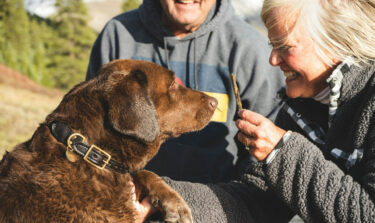
Seven tips to lose weight after Christmas
If you’re on a weight loss journey, Christmas and New Year can make it more challenging to stay consistent with weight management strategies. So, it’s understandable if you’ve put on weight over Christmas.
Remember to be compassionate with yourself during this time – focus on what you can do now to build healthy, positive change in your life and support your weight loss journey.
If you’re curious about whether a weight management programme could help you in the new year, Oviva provides healthcare support across diet, exercise and mental health, plus access to prescription weight loss medication.
Key Takeaways
- It’s not about chastising yourself about what has been, instead, think about what’s going to help your weight loss journey going forward.
- The best strategies for losing Christmas weight are based on balance and adopting sustainable behaviours rather than aiming for quick fixes.
- Making sensible adjustments to your diet and adding exercise to your routine can help you lose weight after Christmas.
- A weight management programme like Oviva can help you start the new year with the information and strategies needed for sustainable weight loss.
How to lose weight after Christmas – seven tips
The following seven weight loss tips can help you to manage your weight after Christmas:
1. Manage your emotions and focus on getting your diet back on track
Be kind to yourself – you’re certainly not alone in putting on weight over the festive period. At the same time, try to focus your efforts on building or re-establishing positive behaviours.
The expectations and pressures around Christmas can easily lead to weight gain, and it’s essential to try to manage any feelings of shame, guilt or disappointment if you do put on weight. Guilt and shame, in particular, have associations with increased binge eating, so try to reframe these feelings and redirect your energy to getting back on track instead.
2. Drink more water and give your body time to lose water weight
An increase in salty foods over Christmas can lead to water retention. According to the NHS, reducing salt intake in your diet can lead to a reduction in water retention, as can drinking more water. As an added bonus, increasing water intake can have a small appetite suppression effect and help you reduce the amount of sugary drinks you consume.
Water retention can sometimes cause the scales to show an extra pound or two. Give your body time to readjust to your post-Christmas diet for a more accurate weight reading.

3. Get Christmas foods out of the house and replace them with healthy snacks
If you have leftover Christmas foods after the holidays, including snacks and alcohol, try to get them out of the house, as they’ll only make it harder to eat healthily. Give unwanted food away to friends and family or donate to a food bank to minimise food waste.
Try to replace unhealthy snacks with healthy snacks that you can eat in moderation throughout the day, such as unsalted nuts and seeds or vegetable sticks with hummus.
4. Focus on balance and sustainable actions rather than quick fixes
If you put on weight over the festive period, it’s easy to fall into the trap of looking for quick fixes, such as crash diets. Nevertheless, the best approach to healthy eating after Christmas is to focus on sustainable changes to nutrition and adopting a balanced, sustainable diet.
As you start to rebalance your eating habits, it may be beneficial to follow a healthy meal plan, at least until you start to get a better sense of the types of foods you should focus on. This can help you build positive eating behaviours that develop into long-term habits.
5. Try to build exercise or increased physical activity into your routine
Although healthy eating is always the biggest contributor to sustainable weight loss after Christmas, it’s also a good idea to try to insert exercise into your routine or increase your physical activity. Start by going for short walks or simply move around the house more.
If you can, consider adding strength training to your daily lifestyle. This can help reduce the amount of muscle mass you lose as you lose weight.
6. Add more fibre and protein to your diet to increase fullness
Lean proteins and high-fibre foods can help you feel more full, ultimately reducing the amount of food you consume. This, in turn, can lead to weight loss.
Try to increase your consumption of these foods and reduce the empty calories you eat. Beans, lentils, brown rice, and vegetables are examples of foods that are high in fibre. Lean foods with plenty of protein include chicken, fish, and eggs.
7. Access support by joining a weight management programme
Finally, to learn how to lose weight gained over Christmas, consider joining an accredited weight management programme, such as Oviva. A weight management programme can give you the advice and support you need to make healthy changes.
You may also be able to access weight loss medications, like Wegovy, which can help to reduce your appetite and increase feelings of fullness, aiding your weight loss efforts. And, with simple, habit-changing behaviours and preparation, Oviva can help you to avoid weight gain over Christmas next time it comes around too!

Make a healthy start to the new year
The new year provides an excellent opportunity to change your lifestyle and improve your well-being. Oviva can support your weight loss efforts with dietitians, doctors, psychologists, and other healthcare professionals who offer personalised care.
Oviva is an NHS-accredited weight management programme that also provides access to prescription weight loss medications. Through the Oviva app, you can track meals, exercise, and your mood while communicating with a real coach.
Speak to your GP to see if you’re eligible and request a referral.
Our info pack gives you everything you need to start the conversation with your doctor.



